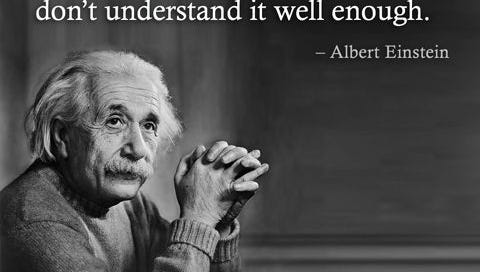

Discover more from Castles in the Sky
There is a popular piece of folk wisdom that I think is misguided. It’s best exemplified by the following Albert Einstein quote people like to share:
“If you can't explain it simply, you don't understand it well enough.”
I don’t really agree, and after doing some research, I’m not sure Einstein did either. He never said this. It’s not a misquote–it’s just completely made up.
While some people misattribute the quote to Einstein, others often misattribute it to Richard Feynman. Feynman didn’t say it either, it’s still made up. But he did have two famous, related quotes. The first one shows he had a different take on simplicity and truth. When asked for a brief statement about what he won the Nobel Prize for, he said:
“If I could explain it to the average person, I wouldn't have been worth the Nobel Prize.”
But then later on, he reveals some nuance in his perspective when he demonstrates the importance of being able to communicate a complex idea to a beginner:
Feynman was a truly great teacher. He prided himself on being able to devise ways to explain even the most profound ideas to beginning students. Once, I said to him, "Dick, explain to me, so that I can understand it, why spin one-half particles obey Fermi-Dirac statistics." Sizing up his audience perfectly, Feynman said, "I'll prepare a freshman lecture on it." But he came back a few days later to say, "I couldn't do it. I couldn't reduce it to the freshman level. That means we don't really understand it."
This is where we get to the crux of the issue, why I think the connection between understanding and simplicity is false. Understanding something and communicating that understanding are two entirely different skills. Communication is important, but conventional wisdom plaes too much relative importance on the value of communicating your understanding.
Depending on the context, the fake Einstein quote above can be true, but sometimes what people are really thinking is, “if I can’t easily understand something, it isn’t true.” When Feynman said that he didn’t understand something if he couldn’t explain it at a freshman level, people invert that and seem to think, “well, if someone says something I don’t understand, they must not really understand it either.”
A great distillation of this attitude is in Kurt Vonnegut’s novel Cat’s Cradle, where one doctor characterizes another saying:
Dr. Hoenikker used to say that any scientist who couldn't explain to an eight-year-old what he was doing was a charlatan.
Some people may believe Feynman was saying the same thing with his freshman lecture quote. However, he was teaching at Caltech at the time. And the problem with this attitude is that most people will never be freshmen at Caltech. What Feynman was saying was that, if he couldn’t break down the topic for an extremely intelligent, motivated audience who already had a decent understanding of the basics, he probably didn’t understand it. This is very different from what a lot of people think, as represented by Vonnegut’s quote.
Consider it a logical puzzle. A simple explanation can be true and elegant, but it doesn’t have to be. This is important because if your criteria for the best explanation is that it is the simplest and most elegant, you are ironically more likely to fall victim to bullshit. Consider any scientific breakthrough ever. Which is simpler, the old explanation, or the new paradigm suggested by the scientific breakthrough?
That’s essentially what bullshit is: believable falsehoods. The truth is often counterintuitive, complex, and a little unbelievable. A trustworthy expert is not necessarily one who is the best at making ideas simple. The degree to which an expert can simplify ideas is not representative of how well they know them. That does not make the opposite true: simplicity is not a telltale sign of a bullshitter.
What I’m advocating for is adding some nuance to the way simplicity intersects with expertise and bullshit. As Feynman’s undergraduate quote implies, to communicate an understanding of a complex idea, you need to do a lot of educating and make a lot of assumptions about your audience. Not being able to communicate a complex idea to complete laypeople has no bearing on someone’s understanding of that idea.
I propose replacing the original quote with two new ones. From the point of view of the explainer, I think we should say:
“If you can’t make a complex idea simple for a motivated beginner, you don’t understand it well enough.”
This updates the original quote, providing guidance on next steps. The original quote just said, if you can’t make it simple you don’t understand it, but it wasn’t very prescriptive about what to do next. With this quote, the fact that you’re explaining to a motivated beginner is informative because it means you need to be able to connect complex ideas to simpler ones. This not only will make for better explanations, it will also promote better understanding for both of you, as the newly simplified idea will be set into a concrete context.
From the point of view of the learner, I think we should say:
“If someone offers you a simple explanation for something complex, investigate what they left out to see if it changes your understanding.”
This is not the same as suggesting, “people who offer simple explanations are trustworthy experts” or the opposite. This doesn’t say anything about the character or motivations of the explainer. Rather, it prompts the learner to investigate simple explanations instead of accepting them at face value. Over time, learners who follow this advice will figure out whether the explainers in question are enhancing or obfuscating their understanding. They will also start to learn where their own blind spots are.
I want to wrap this essay up with a neat bow and a quick explanation, but that would go against the point, right? In summary, how simply someone can explain something is only a relevant indicator in certain contexts with certain audiences. Simplicity should be a goal when you explain something to a motivated beginner, and it should be a sign to investigate further when someone is explaining something to you.
















Complex is complex, no way out of it. But analyzing hypothesis, what about Occam’s razor?
There should be a third new quote, "If you can explain something complex to a tired 61 year old at 11 pm at night and he can still understand it, then you probably really know your shit." Congratulations.